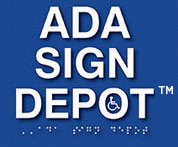Sensible reform needed to fix nation’s ADA
ADA Sign Depot
March 11, 2018

Sensible reform? Or gutting the ADA?
{ Shop all Gender Neutral Bathroom Signs }
The Americans with Disabilities Act Education and Reform Act of 2017 is a vital opportunity to advance the mission of the ADA while protecting business owners from costly lawsuits.
Since 1990, the ADA has served an important purpose by expanding access for disabled Americans to public places. Unfortunately, the law has all too often been abused, with serial litigants taking advantage of the law to file lawsuits purely for monetary gain. For instance, one serial litigant here in California has filed 2,000 lawsuits in federal court since 2004.
Every year, thousands of lawsuits are filed in federal invoking, in particular, Title III of the ADA which, as the Justice Department explains, “prohibits discrimination on the basis of disability in the activities of places of public accommodations.” Examples of places of public accomodations include businesses, restaurants, movie theaters and doctors’ offices, locations that are generally open to the public.
Under the ADA, people who believe they are being denied access in places of public accomodation due to architectural barriers are allowed to file a lawsuit.
The ADA Education and Reform Act of 2017, or H.R. 620, seeks to make the sensible reform of requiring would-be plaintiffs to first provide written notice to the owner or operator of the business with a description of the barrier, the circumstances in which the barrier prevented access and whether the barrier is permanent or temporary.
Business owners would then have 60 days in which to respond with a plan to address the problem. Failure to respond would then allow the would-be plaintiff to proceed with a lawsuit. Business owners who do respond in time will then have an additional 60 days to correct the issue.
This simple, commonsense fix to encourage compliance without requiring costly litigation strikes a reasonable balance between the interests of disabled individuals and the business community.
In the last couple of years, Arizona, California and Minnesota have enacted laws aimed at reducing “drive-by lawsuits” by allowing a grace period for businesses to address certain ADA violations before being subjected to litigation. It’s time for Congress to do the same.
The bill passed the House of Representatives with bipartisan support last month. For the sake of curbing the abuse of a well-intended law and our court systems, we encourage the Senate to take up the proposal and pass it as soon as possible.


